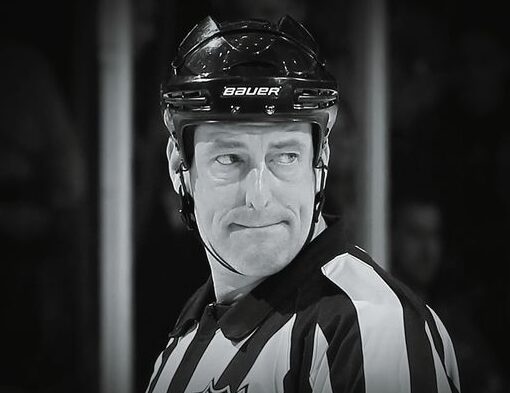Mike Hasenfratz, a retired National Hockey League referee, has passed away at the age of 58, leaving behind a legacy of resilience, dedication, and professionalism.
Born in Regina, Saskatchewan, Hasenfratz pursued his passion for hockey by becoming an official in the NHL, where he debuted on October 21, 2000. That night, he took to the ice for a matchup between the New York Islanders and Washington Capitals, marking the beginning of a career that would span nearly a decade and a half.
Hasenfratz quickly established himself as a respected referee, earning the opportunity to officiate his first playoff game on April 19, 2002. The Detroit Red Wings faced the Vancouver Canucks in that postseason matchup, a testament to Hasenfratz’s skill and composure under pressure.
Throughout his career, he wore two numbers: starting with #30 and later switching to #2 in 2011. The latter number held particular significance for him, symbolizing a triumphant return to his profession after a life-threatening medical ordeal.
Midway through his career, Hasenfratz was diagnosed with an aortic dissection, a condition that could have claimed his life. This serious medical emergency required immediate open-heart surgery, sidelining him for two seasons.
Reflecting on his experience, Hasenfratz once remarked, “It’s the same thing that killed [actor] John Ritter,” underscoring the severity of the condition. Doctors informed him that such cases are often discovered posthumously, highlighting the rarity of his survival and recovery.
Despite the odds, Hasenfratz displayed remarkable determination during his lengthy recovery, undergoing extensive rehabilitation to regain the fitness and endurance required to officiate at hockey’s highest level.
When he returned to the NHL, wearing #2 became a proud emblem of his “second chance” at what he affectionately called “the second-best job in the world, after playing.”
Over his career, Hasenfratz officiated 705 regular-season games, demonstrating an unwavering commitment to the sport he loved. His colleagues and players admired his fairness, professionalism, and ability to maintain composure in the high-stakes atmosphere of the NHL.
His final game on March 16, 2014, was officiated alongside fellow referee Mike Leggo and linesmen Derek Amell and Tim Nowak, marking the conclusion of a distinguished tenure on the ice.


